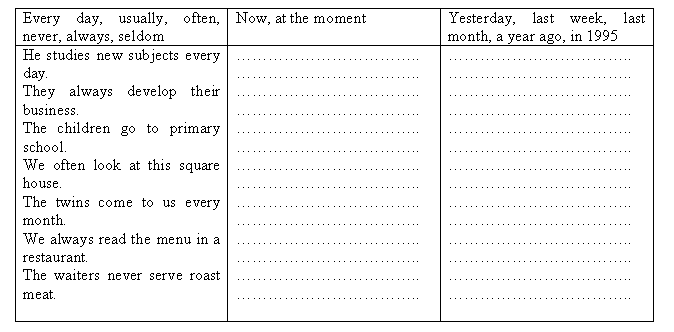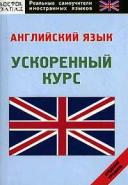Книга: Английский язык: самоучитель
FOCUS ON GRAMMAR Активная грамматика
Разделы на этой странице:
FOCUS ON GRAMMAR
Активная грамматика
Language focus 1
The Past Simple (Indefinite) Tense (more practice)
Прошедшее неопределенное время (дополнительная практика)
1. Put these sentences into the Present Continuous and Past Simple Tenses.
Поставьте данные предложения в Настоящее продолженное и Прошедшее простое времена.
Example: He prepares application forms every day.
He is preparing an application form now.
He prepared an application form last month.

2. Ask General and Special Questions.
Задайте общие и специальные вопросы.
1. We had electricity and central heating on the farm.
………………………………………………………………………………?
What…………………………………………………………………………?
2. The waiter served us very well in that restaurant.
……………………………………………………………………………….?
Where…………………………………………………………………………?
3. He got a diploma in architecture last month.
………………………………………………………………………………..?
What diploma…………………………………………………………………?
4. Her choice was extremely rewarding.
…………………………………………………………………………………?
Whose choice………………………………………………………………….?
5. The twins came to their parents without any news.
…………………………………………………………………………………?
Why……………………………………………………………………………?
6. They studied this subject at the age of ten.
………………………………………………………………………………….?
At what age…………………………………………………………………….?
7. They ordered a lot of delicious food.
………………………………………………………………………………….?
What……………………………………………………………………………?
3. Write a short story in the Past. Use the words given.
Напишите небольшой рассказ в прошедшем времени, используя данные слова.
A. born, date, month, primary school, grandmother, parents, develop, get, extremely rewarding, subjects.
……………………………………………………………………………………………………
B. application form, interview for a job, choice, extremely difficult, diploma, news, congratulations.
……………………………………………………………………………………………………
C. restaurant, waiter, order, gravy, roast, enough, hungry, plain water, enjoy, delicious meal.
……………………………………………………………………………………………………
4. Study some more Irregular Verbs.
Выучите еще несколько неправильных глаголов.
To break-broke
To buy-bought
To bring-brought [bro: t]
To drink-drank
To drive-drove
To eat-ate
To give-gave
To leave-left
To make-made
To meet-met
To put-put
To say-said [sed]
To sell-sold
To send-sent
To speak-spoke
To teach-taught [to: t]
To tell-told
To think-thought
To understand-understood
To write-wrote
Put these stories into Past.
Перепишите рассказы в прошедшем времени.
A. I always go to the same restaurant at the weekend. I drive my car there. I always leave my car at the entrance. The porter says «Good evening» to me. I take the table at the window. They always serve fresh tasty food there. I drink red wine and eat roast and marinated vegetables. For dessert they bring cakes and then ice-cream. Nothing special but…this is just what I want.
…………………………………………………………………………………………
…………………………………………………………………………………………
…………………………………………………………………………………………
…………………………………………………………………………………………
B. My mother is a primary school teacher and I understand her choice very well. She meets new people all the time. And she makes them feel happy. She teaches very small children. It is difficult but extremely rewarding. She thinks very much about her job. In the evening she tells us a lot about her little students. Sometimes she speaks to the kids’ parents or sends notes to them.
…………………………………………………………………………………………
…………………………………………………………………………………………
…………………………………………………………………………………………
…………………………………………………………………………………………
Language focus 2
The Degrees of Comparison of Adjectives
Степени сравнения прилагательных
Как и в русском языке, в английском прилагательные имеют три степени сравнения: положительную, сравнительную и превосходную.
Например, вкусный – вкуснее – самый вкусный
Образование:
У односложных и некоторых двусложных прилагательных (заканчивающихся на – r или – y) степени сравнения образуются путем прибавления к положительной форме суффиксов – er для сравнительной формы и – est для превосходной (эта форма используется с артиклем the).
Cheap – cheaper – t he cheapest
Happy – happier – the happiest
Правописание:
Удваивается согласная после краткой гласной (чтобы сохранить закрытый слог): big – bigger – the biggest.
Конечная – e опускается: nice – nicer – the nicest.
У большинства двусложных прилагательных, а также прилагательных, состоящих из трех и более слогов, степени сравнения образуются при помощи слов more и the most.
Expensive – more expensive – the most expensive
Useful – more useful – the most useful
Исключения, которые необходимо запомнить:
Good – better – the best
Bad – worse – the worst
5. Form the degrees of comparison of adjectives.
Образуйте степени сравнения прилагательных.
Strange -
Interesting -
Simple -
Bad -
Fresh -
Smal l-
Cold -
Comfortable -
Tired -
Wet -
Hot -
Beautiful -
Healthy -
Important -
Long -
6. Make up your own sentences with the adjectives.
Например: longer
This way is longer than that one.
the longest
That way is the longest (of all three).
more comfortable
………………………………………………………………………………………………..
easier
………………………………………………………………………………………………..
more relaxing
………………………………………………………………………………………………..
the biggest
……………………………………………………………………………………………….
the most expensive
………………………………………………………………………………………………..
the worst
………………………………………………………………………………………………..
the most stressful
……………………………………………………………………………………………….
nicer
……………………………………………………………………………………………….
better
………………………………………………………………………………………………
7. Translate into Russian. Pay special attention to the articles.
Переведите на русский язык. Обратите особое внимание на употребление артиклей.
A better teacher, the best teacher, a more expensive area, more important post, the most interesting meeting, a worse soccer match, the worst food, better food, a better holiday, the most comfortable flight, the oldest castle, a hotter day, a more interesting subject, more interesting subjects, the worst choice, a bigger part, the most important year.
8. Translate into English.
Переведите на английский язык.
1. Этот год был лучшим и наиболее полезным в моей жизни.
……………………………………………………………………………………………….
2. Он рассказал нам о более важном предмете в нашей школе.
……………………………………………………………………………………………….
3. Первый класс был самым сложным для меня.
……………………………………………………………………………………………….
4. Мы увидели самые плохие фермы в нашем районе.
……………………………………………………………………………………………….
5. Я заинтересован принять участие в самом интересном проекте года.
……………………………………………………………………………………………….
6. Его выбор не хуже Вашего, но лучше моего (mine).
……………………………………………………………………………………………….
7. Я думаю, это более современный замок на этой территории.
……………………………………………………………………………………………….




